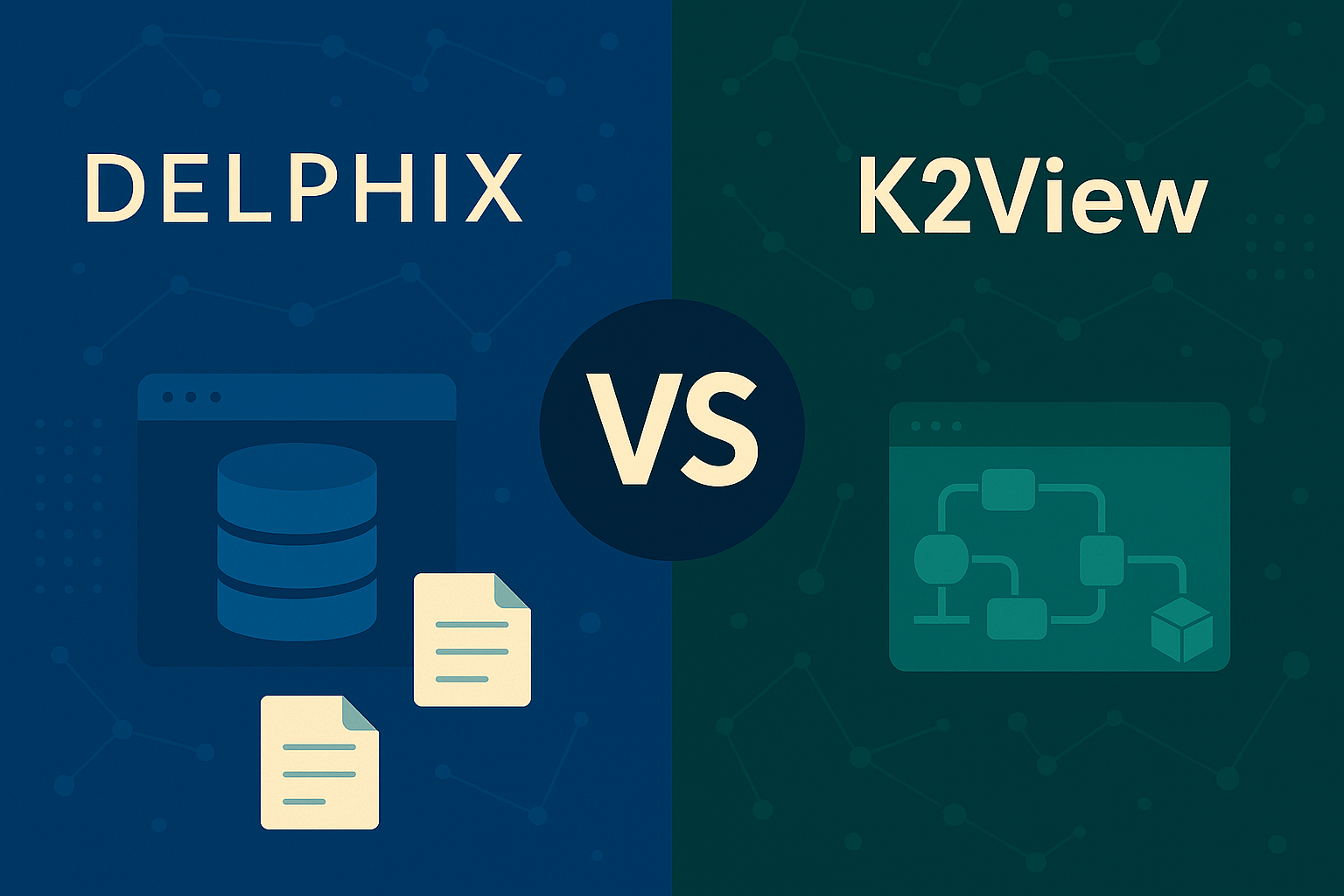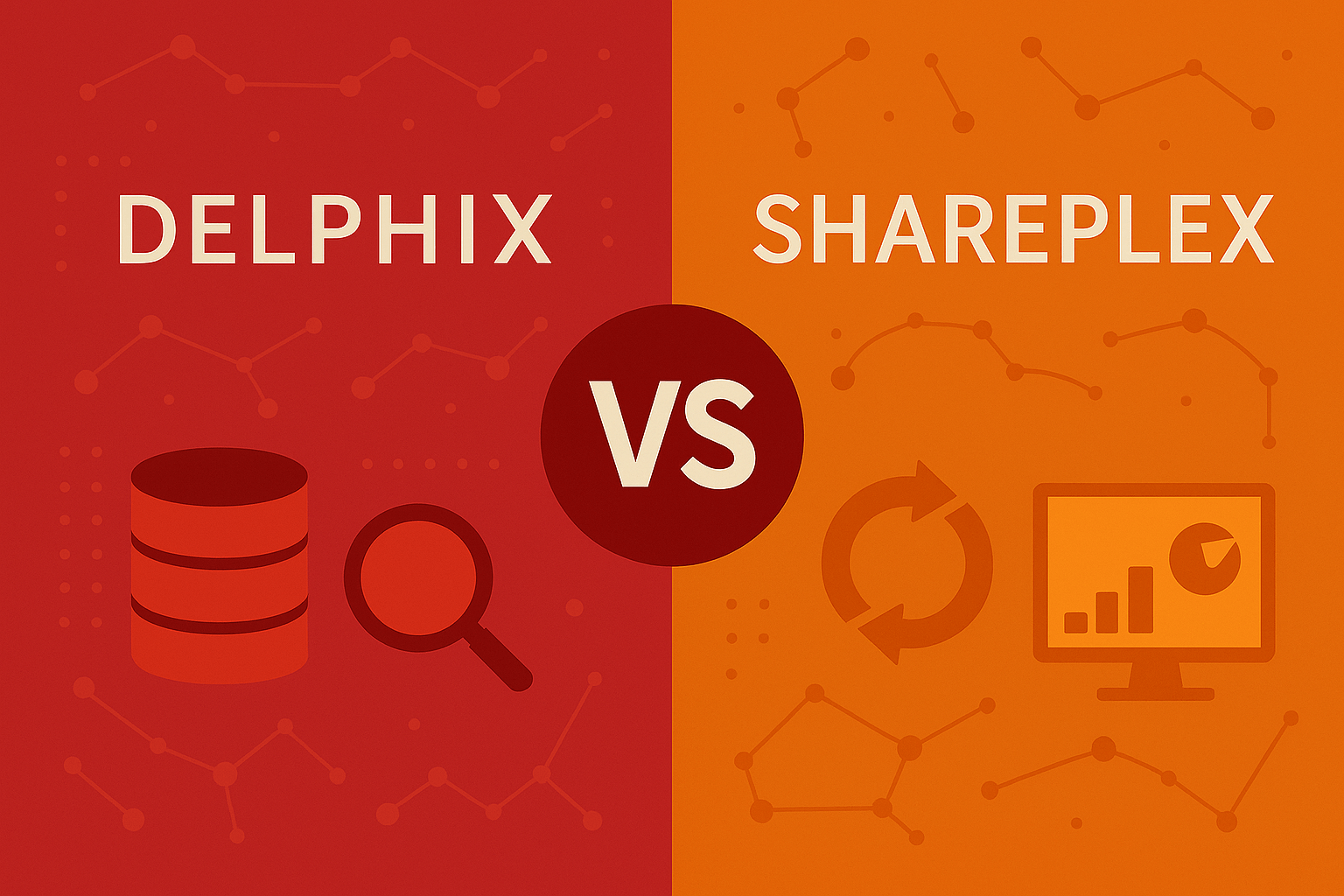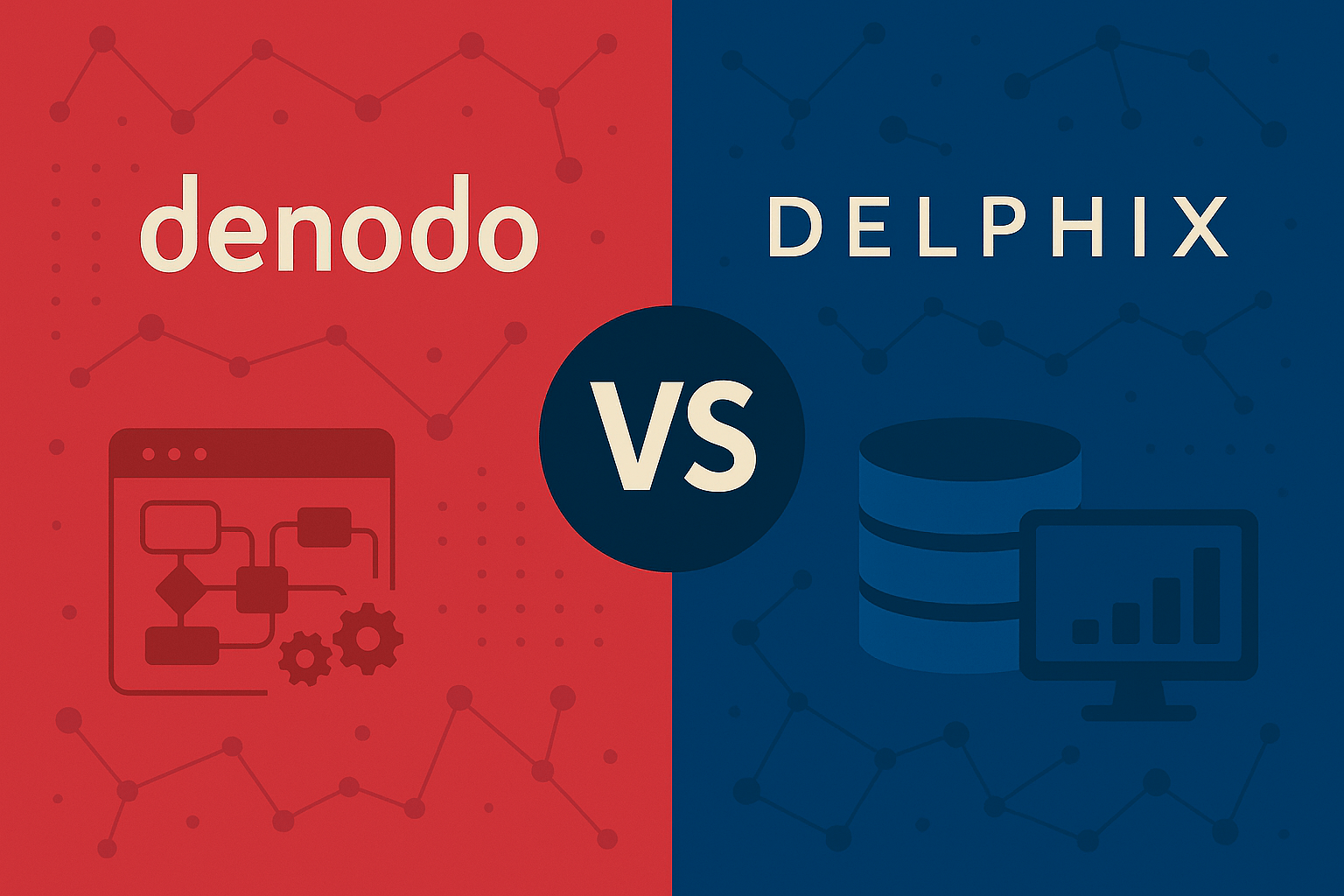Delphix vs VDP: Which Database Virtualization Platform is Right for Your Organization?
Modern organizations face mounting pressure to accelerate development time while maintaining data security and compliance. As teams demand faster access to production-like data for testing and development, the choice between database virtualization platforms becomes critical for long-term success. Database virtualization simplifies data handling by abstracting physical storage from the database layer, making it easier to manage and provision data. This approach fits well with agile development and DevOps methodologies, enabling teams to streamline workflows and adapt quickly to changing requirements.
When evaluating Delphix vs VDP, you’re essentially choosing between two fundamentally different approaches to data virtualization. Delphix, as a company with a long-standing presence in the market, offers a proven monolithic architecture that has dominated the market since 2008, while VDP is an offering from Actifio, a company known for its innovation in data management, bringing a pipeline-based approach that emphasizes automated workflows and Google Cloud integration. Actifio's Virtual Data Pipeline captures data in its native format from production application sources, ensuring compatibility and efficiency in data handling.
This comprehensive guide will help you understand which platform aligns with your organization’s specific needs, existing infrastructure, and data management strategy. Both solutions are designed to address the unique challenges of modern data management and virtualization, and both excel in test data management, but their architectural differences mean one will likely be a better fit for your environment than the other.
Choose the Right Data Virtualization Solution
The decision between these platforms extends far beyond basic functionality. While both Delphix and VDP deliver effective database virtualization, they approach the challenge from distinctly different angles that impact everything from implementation complexity to long-term scalability.
Understanding these differences is crucial because your choice will influence how your teams access data, manage storage requirements, and integrate with existing systems. The wrong selection can lead to performance bottlenecks, increased costs, and frustrated development teams who struggle with slow provisioning processes.
Organizations today need solutions that not only provide virtual copies of production databases but also ensure these copies remain consistent, secure, and readily accessible across various types of development and testing scenarios. With database virtualization, data can be accessed on-demand, supporting agile development and testing by enabling rapid, flexible, and efficient data management. This approach offers unprecedented flexibility, efficiency, and cost-effectiveness in managing test environments. Many organizations struggle with data refresh processes, which can introduce data security risks during testing. Additionally, synthetic data generation is increasingly used to create test data without privacy or regulatory risks, further enhancing the security and compliance of testing processes. Effective TDM is crucial for insurance companies to maintain their competitive edge amid evolving industry requirements. Accelario provides a self-service portal for generating virtual test data environments, further streamlining the testing process.
What Makes These Platforms Unique?

Both platforms offer unique capabilities that streamline test data management and data virtualization for organizations. Importantly, both platforms play a significant role in TDM (Test Data Management), supporting data privacy and compliance initiatives. Test Data Management helps organizations utilize accurate and representative test data for effective testing within CI/CD pipelines, ensuring robust and reliable software development processes. Appropriate TDM solutions require understanding the needs and data requirements of the organization. Delphix and Actifio provide enterprise-scale solutions compatible with CI/CD and DevOps processes, making them highly suitable for modern development environments. Data Integration involves processes like data transformation and data cleansing to ensure data quality and usability, which are critical for effective TDM.
Delphix – Monolithic Architecture Excellence
Delphix has maintained its position as a market leader in database virtualization since establishing its presence in 2008. The platform built its reputation on a ZFS-based monolithic architecture that integrates storage management, data virtualization, and application provisioning into a unified system.
This monolithic approach provides several key advantages that have made Delphix the go-to choice for many enterprise organizations. The platform delivers high-performance data access while maintaining minimal storage requirements, often achieving up to 90% reduction in storage footprint compared to traditional copy-based approaches.
The architecture excels at decoupling database, storage, and application layers, which facilitates rapid provisioning of virtual databases (VDBs) that maintain full functionality while consuming only incremental storage space. Delphix's monolithic architecture specializes in decoupling the database layer from storage and application layers. This design has proven its longevity in production environments across thousands of organizations worldwide. Enov8's vME solution is known for its federated architecture and compatibility with various database types, offering another approach in the data management space.
Delphix’s integrated data masking capabilities address compliance requirements for industries handling sensitive information, automatically applying consistent masking rules across all virtual copies to ensure regulatory adherence without manual intervention. Legislation like GDPR requires organizations to handle data responsibly and avoid using live customer data for testing to mitigate legal risks, making such masking capabilities essential. Delphix is one of the best-known tools in the market due to its longevity and proven track record in addressing these critical compliance needs. Perforce Delphix focuses on Test Data Management (TDM) and holds a larger mindshare of 28.3% in that area.
VDP – Pipeline-Based Automation
Virtual Data Pipeline technology, pioneered by Actifio since 2009, takes a fundamentally different approach to data virtualization through its pipeline-based architecture. This design emphasizes automated self-service provisioning and enterprise workload refresh capabilities that reduce manual overhead for database administrators. Actifio's technology aims to reduce the time it takes to provide virtual data copies to non-production users, enhancing development speed and enabling faster iterations in software development cycles. It is worth noting that the acronym VDP can also refer to Variable Data Printing or Vulnerability Disclosure Policy, which are unrelated to Delphix's data management functions.
The pipeline approach centers around maintaining a single master copy of source data while providing controlled workflows for creating and managing virtual copies. Block-level incremental updates ensure that changes propagate efficiently across the pipeline without requiring full data refreshes. In legacy IT environments, VDP referred to VMware's vSphere Data Protection, which is now obsolete.
VDP’s integration with the Google Cloud ecosystem provides significant advantages for organizations already invested in Google Cloud Platform services. This native integration facilitates hybrid cloud deployments and simplifies data movement between on-premises and cloud environments. Additionally, Delphix's engine can be deployed as a virtual machine in major cloud marketplaces such as AWS, Azure, and Google Cloud, offering flexibility for diverse infrastructure needs.
The platform’s automation capabilities extend beyond basic provisioning to include policy-driven workflows that can automatically refresh test environments, apply data masking rules, and manage the lifecycle of virtual copies based on predefined criteria.
Delphix vs VDP: Architecture and Implementation Differences
Technical Architecture
The architectural differences between these platforms fundamentally impact how they handle data, storage, and performance optimization. Understanding these distinctions helps predict how each solution will behave in your specific environment.
Delphix employs a monolithic ZFS-based architecture that combines data storage, virtualization logic, and management functions within a single integrated system. This design provides tight coupling between storage and application layers, enabling highly optimized data access patterns and efficient snapshot management.
VDP utilizes a pipeline-based architecture that separates data capture, processing, and provisioning into distinct stages. Block-level incremental capture technology ensures minimal impact on source systems while maintaining consistent copies across the pipeline.
Storage Approach Impact:
-
Delphix: Direct integration with ZFS provides advanced deduplication, compression, and snapshot capabilities that minimize storage overhead
-
VDP: Pipeline storage focuses on incremental block-level changes, reducing network bandwidth and storage requirements for updates
-
Performance considerations vary significantly based on workload patterns and infrastructure design
Data Management Approach
The way each platform manages data reflects their architectural philosophies and impacts day-to-day operations for development teams and database administrators.
Delphix enables direct database virtualization by creating lightweight, writable copies that appear as full databases to applications. These virtual databases maintain complete functionality while sharing underlying storage blocks through copy-on-write mechanisms. Data Integration solutions play a crucial role in enabling timely and accurate reporting for businesses, complementing the capabilities of database virtualization by ensuring that data is both accessible and actionable.
VDP maintains a master copy approach where incremental updates flow through the pipeline to create point-in-time copies. Policy-driven workflows automate many aspects of copy lifecycle management, including creation, refresh, and retirement based on business rules.
Key Differences in Data Masking:
-
Delphix: Integrated masking engine applies transformations during provisioning, ensuring consistent protection across all virtual copies
-
VDP: Policy-based masking rules can be applied at various pipeline stages, providing flexibility in when and how data protection occurs
For example, a team might use test data management techniques to create data copies that comply with regulatory requirements or to develop complex test scenarios that mirror real-world challenges.
Provisioning Speed and Automation:
-
Delphix: Near-instantaneous VDB creation from existing snapshots, with full database functionality immediately available
-
VDP: Automated self-service portals allow developers to request and receive virtual copies without administrator intervention
Database Support
Both platforms support major database technologies, but their implementation approaches and optimization levels vary across different database types.
Oracle Support:
-
Delphix: Native Oracle integration with support for RAC clusters, ASM, and advanced Oracle features
-
VDP: Oracle support through pipeline capture with good performance characteristics
SQL Server Compatibility:
-
Delphix: Full SQL Server support including AlwaysOn availability groups and advanced security features
-
VDP: Comprehensive SQL Server integration with automated failover capabilities
Additional Database Support:
-
Delphix: PostgreSQL, MySQL, SAP HANA, IBM Db2, MongoDB with varying levels of optimization
-
VDP: Broad database support through pipeline architecture, with consistent management across all supported types
-
Enov8 vME: Known for its broader database support, offering a competing feature in the data management space
-
Delphix: PostgreSQL, MySQL, SAP HANA, IBM Db2, MongoDB with varying levels of optimization
-
VDP: Broad database support through pipeline architecture, with consistent management across all supported types
Cloud and On-Premises Deployment:
-
Delphix: Supports hybrid deployments with cloud-native versions available for major cloud providers
-
VDP: Strong Google Cloud integration with good support for other cloud platforms and on-premises deployment
What Experienced Users Say

Understanding real-world user experiences provides valuable insights that go beyond vendor marketing materials and technical specifications. User reviews provide critical insights into the strengths and weaknesses of each platform. Organizations that have implemented either platform offer practical perspectives on deployment complexity, ongoing operations, and actual business value delivered.
Delphix Users Praise:
Long-term Delphix users consistently highlight the platform’s proven stability in production environments. Many organizations report running Delphix continuously for years without significant issues, with the monolithic architecture providing predictable performance characteristics that simplify capacity planning and troubleshooting.
The comprehensive data management capabilities receive frequent mention, particularly the tight integration between virtualization, masking, and compliance features. Users appreciate that they can address multiple data management challenges through a single platform rather than cobbling together separate tools.
Clients from various industries have leveraged Delphix to support their digital transformation and regulatory compliance efforts, often partnering with Delphix to tailor solutions to their specific needs.
Storage efficiency consistently exceeds expectations, with many users achieving the promised 90% reduction in storage requirements. This efficiency extends beyond just space savings to include faster backup processes and simplified disaster recovery procedures.
VDP Users Appreciate:
Organizations using VDP frequently emphasize the automated provisioning capabilities that reduce manual work for database administrators. The self-service portals allow development teams to provision and manage their own data copies without creating bottlenecks in central IT teams.
Pipeline efficiency receives positive feedback, particularly in environments with frequent data refresh requirements. The incremental block-level updates minimize network impact and reduce the time required to propagate changes across multiple environments.
Clients have also used VDP to accelerate digital transformation initiatives and meet compliance requirements, with tailored solutions supporting unique business needs.
Google Cloud integration benefits are consistently mentioned by users already invested in Google Cloud Platform services. The native integration simplifies hybrid cloud implementations and provides better performance for cloud-based development environments.
Common Feedback on Implementation:
Both platforms require significant planning and expertise during initial implementation. Users recommend engaging with vendor professional services teams during deployment to avoid common pitfalls and ensure optimal configuration. Many clients note the need to review the security configurations and compliance settings during setup to ensure regulatory requirements are met.
Learning curves vary by platform, with Delphix requiring deeper understanding of its monolithic architecture, while VDP demands familiarity with pipeline concepts and policy management frameworks.
User Experiences with Vendor Support:
Support quality and responsiveness vary between vendors, with users generally reporting good technical support from both companies. However, the depth of community resources and third-party integrations differs significantly between platforms.
Implementation Requirements Overview

Understanding implementation requirements helps organizations plan for successful deployments and avoid common pitfalls that can derail virtualization projects.
Delphix Infrastructure Requirements:
The monolithic architecture requires careful planning around ZFS infrastructure and storage design. Organizations need to ensure adequate IOPS capacity and low-latency storage to support the integrated storage management functions.
Network requirements are particularly critical for Delphix deployments. The platform performs best with sub-1ms latency between the Delphix engine and target databases, ideally maintaining latency under 300 microseconds. Network architects need to minimize hops and avoid unnecessary firewall traversal to achieve optimal performance.
Storage planning involves more than just capacity considerations. The ZFS-based architecture benefits from specific storage configurations that optimize deduplication and compression ratios. Organizations should plan for adequate memory allocation to support ZFS caching mechanisms.
VDP Infrastructure Setup:
Pipeline infrastructure requires different planning considerations, focusing on the incremental backup capabilities and policy management framework. The distributed nature of the pipeline allows for more flexible deployment models but requires coordination across multiple components.
Block-level incremental technology places specific demands on storage systems, particularly around change tracking and consistent point-in-time snapshots. Storage systems must support efficient incremental capture without impacting source database performance.
Policy management framework setup involves defining workflows, approval processes, and automation rules that govern how virtual copies are created, managed, and retired throughout their lifecycle.
Common Requirements for Both Platforms:
Network bandwidth planning must account for initial data ingestion and ongoing incremental updates. Both platforms benefit from dedicated network infrastructure that isolates virtualization traffic from production workloads.
Before proceeding with deployment, it is essential to establish a secure connection to ensure the security of your connection and prevent unauthorized access. Organizations need to review the security of their network infrastructure and address any issues that need to be reviewed before full deployment. Verifying the connection before proceeding is a critical step in the implementation process to prevent security breaches.
Security protocols need careful consideration, particularly around data encryption, access controls, and audit logging. Organizations must ensure that virtualization infrastructure meets the same security standards as production databases.
Database connectivity requirements include appropriate driver versions, network protocols, and authentication mechanisms. Testing connectivity thoroughly before full deployment prevents common integration issues.
Staff Training and Expertise:
Both platforms require specialized knowledge for optimal operation. Organizations should plan for training database administrators, storage administrators, and development teams on platform-specific concepts and procedures.
Delphix expertise centers around understanding ZFS behavior, network optimization, and integrated masking configuration. Teams need familiarity with the monolithic architecture’s performance characteristics and troubleshooting approaches.
VDP knowledge focuses on pipeline management, policy configuration, and automation framework setup. Teams must understand how to design effective workflows and troubleshoot pipeline issues when they occur.
Which Platform is Right for Your Organization?

The choice between Delphix and VDP ultimately depends on your organization’s specific requirements, existing infrastructure, and long-term data strategy. Making the right decision requires honest assessment of your current capabilities and future needs.
Choose Delphix if you want:
Proven Market Leadership with Established Track Record
Organizations that value stability and proven technology should strongly consider Delphix’s fifteen-year track record in database virtualization. The platform has demonstrated its reliability across thousands of enterprise deployments, providing confidence for mission-critical implementations.
The extensive customer base means robust community support, comprehensive documentation, and mature third-party integrations that simplify deployment and ongoing operations.
Monolithic Architecture with Integrated Storage Management
Companies seeking unified data management will appreciate Delphix’s integrated approach that combines virtualization, storage optimization, and data masking within a single platform. This integration simplifies vendor management and reduces the complexity of tool integration.
The monolithic design provides predictable performance characteristics that facilitate capacity planning and troubleshooting, particularly valuable for organizations with limited specialized expertise.
High-Performance Data Access with Minimal Storage Footprint
Organizations facing storage cost pressures or performance requirements will benefit from Delphix’s highly optimized storage efficiency. The platform’s ability to achieve 90% storage reduction while maintaining full database functionality addresses both cost and performance concerns simultaneously.
The direct database virtualization approach ensures that applications experience minimal performance impact when accessing virtual copies, supporting intensive testing and development workflows.
Comprehensive Database Virtualization without Pipeline Dependencies
Companies with diverse database environments will appreciate Delphix’s broad support for Oracle, SQL Server, PostgreSQL, and other major database platforms. The consistent management approach across different database types simplifies operations and training requirements.
The platform’s maturity across various database technologies means fewer surprises during implementation and more predictable behavior in production environments.
Choose VDP if you want:
Pipeline-Based Automation with Self-Service Provisioning
Organizations seeking to reduce manual overhead and empower development teams should consider VDP’s automated provisioning capabilities. The self-service portals allow developers to manage their own data copies without creating bottlenecks in central IT teams.
The pipeline approach provides natural workflow automation that can integrate with existing DevOps processes and CI/CD pipelines, supporting agile development methodologies.
Google Cloud Ecosystem Integration Benefits
Companies already invested in Google Cloud Platform services will find significant value in VDP’s native integration capabilities. The tight coupling with Google Cloud services simplifies hybrid cloud implementations and provides optimized performance for cloud-based workloads.
The integration extends beyond basic connectivity to include automated scaling, integrated monitoring, and unified management across on-premises and cloud environments.
Block-Level Incremental Updates with Master Copy Approach
Organizations with frequently changing data or distributed development teams will benefit from VDP’s efficient incremental update mechanisms. The block-level change tracking minimizes network impact and reduces time required for data refresh operations.
The master copy approach ensures consistency across all virtual copies while providing flexibility in how updates are applied and managed across different environments.
Enterprise Workload Automation and Policy-Driven Workflows
Companies with complex governance requirements or large-scale operations will appreciate VDP’s policy-driven automation capabilities. The platform can automatically apply business rules around data lifecycle management, compliance requirements, and resource allocation.
The enterprise workload automation extends beyond database virtualization to support broader data management workflows that span multiple systems and technologies.
When making your final decision, carefully evaluate your organization’s current infrastructure, technical expertise, and long-term data strategy. If you're considering solutions beyond the primary options, you may want to review the top 10 Matillion alternatives for data integration in 2025 to find the platform that best fits your needs. Consider conducting pilot implementations with both platforms to understand how they perform in your specific environment before committing to a full deployment.
The right choice will align with your existing tools and processes while providing the scalability and flexibility needed to support your organization’s evolving data management requirements. Remember that both platforms represent significant investments in technology and expertise, so choosing the one that best fits your organizational culture and technical capabilities will provide the greatest long-term value.
Built for the Plant Floor: Factory Thread vs Delphix vs VDP
Delphix and VDP both support database virtualization, but Factory Thread goes beyond developer-focused test data to deliver real-time, governed access across OT and IT systems—critical for modern manufacturing environments.
Why manufacturers choose Factory Thread:
-
Federated access, no full clones – Real-time data from MES, ERP, historians, and quality systems without replication delays
-
Edge-ready by design – Deploy on-prem, cloud, or hybrid—even in air-gapped environments
-
Secure test data in minutes – Low-code workflows provision masked, compliant datasets fast
-
Built-in governance – Role-based access control, audit trails, and compliance tooling included
Factory Thread is built for teams that need more than database clones—it enables trusted access to critical data for product teams, engineers, and analysts working on the factory floor and beyond. Teams evaluating Snowflake alternatives can explore Factory Thread’s capabilities in real-time, no-code industrial data management.
Share this
You May Also Like
These Related Stories

Delphix vs K2View: Which Test Data Management Platform is Right for Your Enterprise?

Delphix vs SharePlex: Which Data Management Solution is Right for You?



No Comments Yet
Let us know what you think